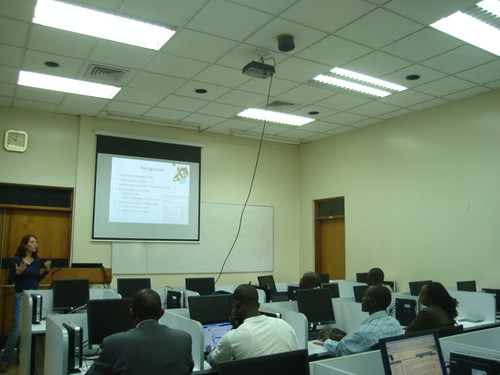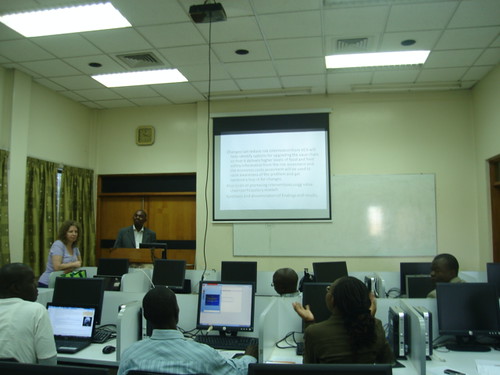 |
| Kristina Roesel presents her PhD proposal during a training workshop on research methods held at ILRI Nairobi (photo credit: ILRI/Tezira Lore). |
On 17-18 April 2012, the Nairobi-based International Livestock Research Institute (ILRI) held a training workshop on research methods for eight PhD students and interns attached to ILRI's Animal Health, Food Safety and Zoonoses team which is led by Delia Grace.
The training was facilitated by staff from ILRI's Research Methods Group, InfoCentre, and Markets, Gender and Livelihoods research theme.
The topics included an introduction to R software for data analysis; systematic literature review; using Mendeley to manage and share research papers; presentation skills; integrating gender analysis in research design; animal care and use; research ethics; how to search for journal articles; and use of web 2.0 tools to communicate research.
The session on gender analysis in research design facilitated by Elizabeth Waithanji of ILRI's Poverty, Gender and Impact team was particularly useful in helping the students to define gender-responsive goals and objectives leading to the development of research hypotheses and data collection tools that incorporate gender.
"Disaggregating data collection by gender will enable the generation of research evidence on how men and women are impacted differently by the interventions," Waithanji said.
 |
| James Kahunyo presents his PhD proposal during a training workshop on research methods held at ILRI Nairobi. Delia Grace (standing left) facilitates the discussion (photo credit: ILRI/Tezira Lore). |
The students also presented their PhD proposals to each other and benefited from group discussions on how to fine-tune their project objectives and scope of activities.
Delia Grace, who is also the coordinator of the agriculture-associated diseases component of the CGIAR Research Program on Agriculture for Nutrition and Health, gave the students tips on how to improve their presentation skills to enable them effectively communicate their research not only to their peers but also to international and non-specialist audiences.
"I found the training to be a very useful opportunity for me to practise my presentation skills and I hope to get better with time," said Isaiah Akuku, a research intern attached to ILRI under a capacity strengthening program of the Consortium for National Health Research (CNHR).
"During my internship, I hope to gain knowledge, skills and experience in research for health so that I can contribute to tackling emerging infectious diseases," he added.
The students' research projects fall under the areas of emerging infectious diseases and zoonoses (Rift Valley fever and mapping of zoonoses hotspots) and food safety (mycotoxins, and public health risks associated with dairy and pig value chains).
The students are from Freie Universität Berlin, the University of Nairobi and Wageningen University.

No comments:
Post a Comment